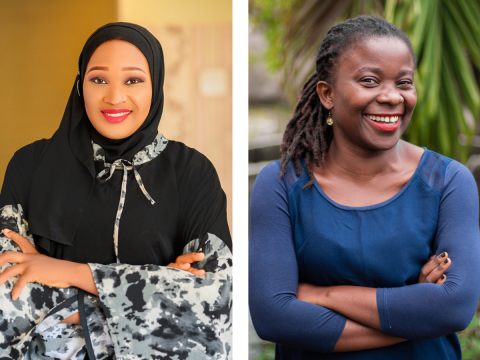
Zainab Bala, a broadcast reporter who exposed pernicious child neglect in Nigeria, and Bernadette Vivuya, a multimedia journalist who uncovered child labor in mines in the Democratic Republic of Congo, are the 2021 winners of the Michael Elliott Award for Excellence in African Storytelling. A distinguished panel of judges selected the winners from among 130 applicants.
Bala, a Nigerian broadcaster with Viewer Television, produced The Almajiri, a gripping documentary that focused on children in northern Nigeria who left their homes for Islamic education in the nation’s capital where they were neglected and abused by their religious teachers. In graphic footage, she showed how some children were restrained in chains and others were forced to beg for food.
Vivuya’s winning entry focused on children in Congo who toiled in niobium, cassiterite and coltan mines that produce raw materials used in making capacitors for electronic devices. Published by Equal Times, the story showed how Congolese children facing crushing poverty were forced into such backbreaking work and fell outside the global goal of ending child labor.
Judges were also impressed with the work of Samar Medhat of Egypt, whose investigative piece, Egypt's Corpseless Coffins, centered on fraudsters faking their own deaths to scam insurance companies.
The prestigious award is given by the International Center for Journalists (ICFJ) in partnership with ONE and the Elliott family. It was established in 2016 in honor of Michael Elliott, an outstanding editor and philanthropist whose life was a testament to the power of storytelling to bear witness to and improve the human condition.
The prize aims to advance the work of emerging journalists in Africa who strive to strengthen people’s voices and improve their well-being. Previous winners include Kenyan journalists Mercy Juma and Dorcas Wangira, and Nigerian journalists Abubakar Ibrahim and Kiki Mordi.
“I am delighted that the generosity of donors, along with fresh support from The Economist, allows the program to benefit two winners for the first time this year, the award’s fifth season,” said Emma Oxford, Michael Elliott’s widow. “Mike would be thrilled by the range and quality of the finalist entries, as were the judges. I am most grateful to my fellow judges and to the staff of ICFJ for their thoughtful review of the entries, and I wish much success to the two talented winners: Zainab Bala and Bernadette Vivuya.”
“The award is a fitting tribute to Mike Elliott, and a brilliant reflection of the richness of storytelling talent in Africa,” said Daniel Franklin, executive and diplomatic editor of The Economist and a member of this year’s jury. “This initiative to support rising journalists goes from strength to strength, and The Economist is delighted to support its expansion.
Bala and Vivuya will receive a cash prize and take part in a customized digital program designed to further their professional development. They will exchange knowledge with journalists from top U.S. and U.K. newsrooms and learn new skills from media mentors. One of the winners supported by The Economist will be hosted for a virtual internship at the corporation’s headquarters in London.
Lionel Barber, former editor of the Financial Times and author of The Powerful and the Damned, chaired the international panel that selected Bala and Vivuya. The judges included:
Joyce Barnathan, President, ICFJ
Matthew Bishop, Nonresident Senior Fellow, Global Economy and Development, Brookings Institution
Kate Critchley, Executive Director, Communications and Content, ONE
Daniel Franklin, Executive and Diplomatic Editor, The Economist
Catherine Gicheru, ICFJ Knight Fellow, Kenya and director of The Africa Women Journalism Project
Abubakar Ibrahim, Features Editor, Daily Trust and 2018 Elliott Award winner
Mercy Juma, BBC Africa correspondent and 2017 Elliott Award winner
Rik Kirkland, Senior Advisor, McKinsey and Company
Emma Oxford, Author, At Least We Lived
Dorcas Wangira, Feature Writer, Citizen Television and 2019 Elliott Award winner
Elliott served as a top editor at The Economist, Newsweek and Time before becoming CEO of ONE. A passionate writer and editor with a gift for unraveling complex issues, he shone a light on global development issues and the people at their center. A longtime board member of ICFJ, Elliott championed great journalism as a tool for empowerment. As ONE’s CEO, he lobbied to improve the lives of all Africans. Shortly before his untimely death in 2016, he spoke of his dream to establish an award that would bring together his belief in great journalism with his commitment to progress in Africa.